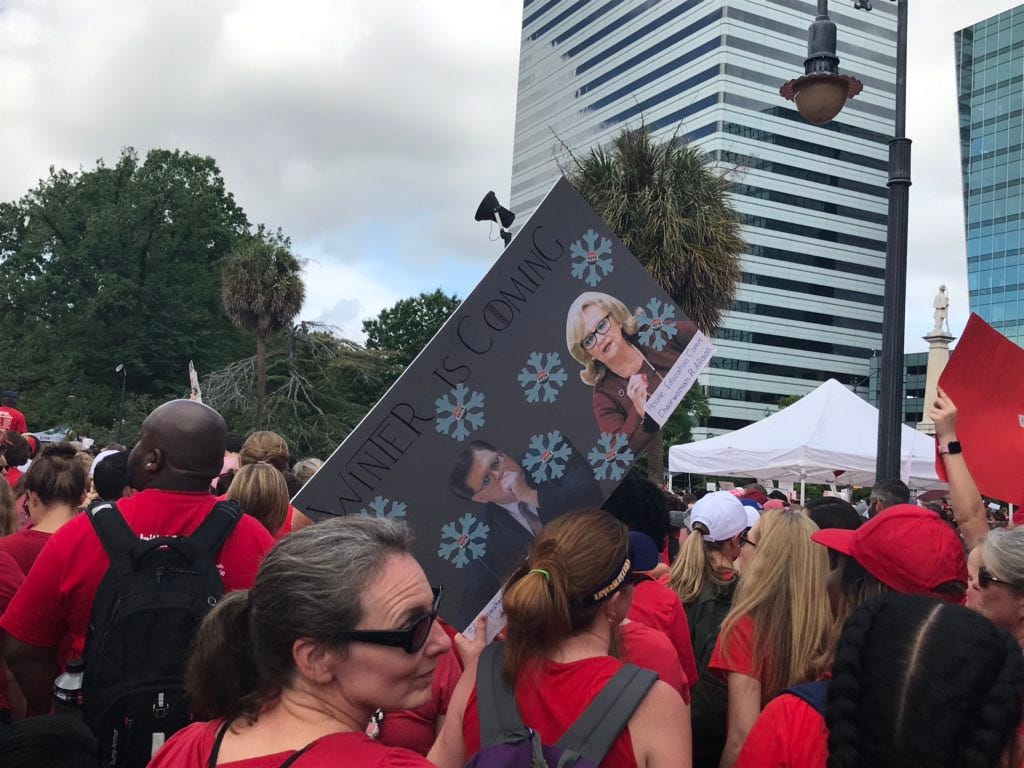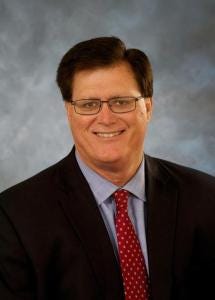Who cares about a polite Republican?
You do not, under any circumstances, “gotta hand it to them”

One of the most powerful Republicans in South Carolina, state House Speaker Jay Lucas, announced last week he would not seek re-election after serving as speaker since December 2014.
Cue the puff pieces looking back on Lucas’ political career, including one from Post and Courier editorial board member Cindi Ross Scoppe titled “Jay Lucas has made SC better in ways you’ve never heard of.” Here’s how she starts the piece:
I was on my crusade to convince the Legislature to debate the whole state budget rather than just new money when I first noticed Jay Lucas.
I was smitten immediately.
First of all, if I were smitten with one of the most powerful politicians in my state, I would simply keep that information to myself.
Furthermore, the opinion piece that follows is a curiously selective overview of Lucas’ career, focusing on his apparent personal charm and a few tepid attempts at increasing oversight for state agencies. Scoppe eschews nearly all analysis of the ways in which Lucas gutted state education funding, catered to the interests of our state’s wealthiest few, and ignored the material needs of his constituents while dragging his feet on the simplest symbolic steps toward racial reconciliation.
There is a tendency in the political press to make nice with authority figures, and it has never sat well with me. When I worked at The Post and Courier, I occasionally got pressure from editors to throw a softball in the name of maintaining a cordial relationship with the politicians I covered. I bristled every time; some days I pushed back and other days I swallowed my integrity and wrote the damn puff piece.
The industry slang for this type of article is a “beat sweetener” or “source greaser,” which Timothy Noah once described in Slate as “a gratuitously flattering profile that a reporter writes about a government official in the hope that it will encourage (or, at the very least, not impede) that reporter’s access to the official in question.”
I don’t pretend to know the motivations of Scoppe, a knowledgeable Statehouse watcher who has written critically about Lucas and company before. The bulk of her opinion column was about Lucas’ attempt to rein in some out-of-control spending and cronyism in the state Department of Transportation, which had a history of fishy contracts. (Even after Lucas’ interventions, the department continued awarding beaucoup bucks to a concrete company co-owned by state Sen. Hugh Leatherman, another political savant from the Pee Dee region, whose death while in office in November was met by similar waves of adulation.)
Scoppe writes:
Dismantling one of the last vestiges of South Carolina’s early 20th century patronage model was probably more important than the more populist changes we’ve been hearing about since he announced Tuesday he would step down as House speaker, a job he’s held since 2014. There are numerous other important wonky reforms to his credit. More obscure is one of the first decisions he made as speaker, which has helped focus legislative attention on state agencies’ performance.
No, he didn’t achieve my dream of thorough, routine spending reviews — a task that is even more logistically difficult today than it was when we first discussed it 15 years ago. But he used the then-new legislative oversight law to create a House Oversight Committee, populated by experts at examining the inner-workings of state agencies.
Of all the pressing issues in the lives of ordinary South Carolinians, state agency spending reviews could not possibly rank in the top 20 for material impact. South Carolina has the 9th-highest poverty rate of any state in the U.S., with vast and persistent inequality along the same racial lines that have defined our politics since colonial times. We imprison a larger portion of our population, as a state, than any country on earth. We have the 9th-highest maternal mortality rate among the states and have had 4 rural hospitals shut down since leading Republicans here rejected Medicaid expansion under the Affordable Care Act. Lucas and his colleagues in the legislature slashed per-pupil spending on higher education by 32% between 2008 and 2018; as a result tuition costs have soared and our people have the 5th-highest student loan debt per borrower. We give away $423 million a year in corporate tax abatements, robbing our K-12 schools of funding while asking nearly nothing in return and making no efforts to enforce the companies’ end of the deal. We rank dead-last for union membership, we rank 4th-highest for rates of sexually transmitted infections, and 499 of our bridges have been deemed “structurally deficient.”
I will never understand the instinct to write flattering things about men like Jay Lucas in a state like South Carolina.
Jay Lucas is a lawyer, like many of the lawmakers in a state where the annual legislative salary of $10,400 tends to keep all but the well-off from running for office. He has held his House seat since 1998 and has been running unopposed since at least 2008 in state House District 65, one of those districts that looks like a how-to diagram for gerrymandering, spanning parts of Chesterfield, Darlington, Kershaw, and Lancaster counties in and around the Pee Dee. He became House speaker in December 2014 after his predecessor in that role, Rep. Bobby Harrell, resigned amid a campaign finance scandal.
Like most of his colleagues in the Statehouse, Jay Lucas has been laser-focused on slashing taxes, especially for the wealthiest South Carolinians. Despite the state already having the lowest effective tax rate in the Southeast, Lucas and his compatriots have insisted year after year that we needed to lower taxes more so we can show a little leg to “job creators.”
“Our current rate makes South Carolina unfortunately less competitive for new jobs and capital investments,” Lucas said in February 2022 while arguing to slash the top marginal income tax rate from 7% to 6%. (Scoppe, to her credit, skewered Lucas for this ludicrous argument.)
The one nice thing people across the aisle have to say about Lucas’ tenure as House Speaker is that he was cordial and sometimes worked to build bipartisan consensus. He’s leaving office after “8 Kinder, Gentler Years,” the Associated Press tells us. House Minority Leader Todd Rutherford (D-Columbia) told the P&C that Lucas is a big hugger.
“I have hugged the speaker more than any other man in my life,” Rutherford said.
Now, unlike Cindi and Todd, I have neither met nor hugged Jay Lucas. I am willing to believe he is a gentleman, for what that’s worth. But I know some people who tried to talk to him and didn’t get a hug.
On May 1, 2019, a crowd of 10,000 protesters led by teachers and students marched on the South Carolina Statehouse demanding better teaching and learning conditions after decades of defunding and neglect by the legislature. Like nearly all of his colleagues that day, Lucas stayed inside and whined to reporters rather than face the sea of teachers in red shirts on the Statehouse lawn. He blamed unspecified “outside groups” for misleading the teachers in unspecified ways.
“Them leaving the classrooms is a direct result of the misinformation that’s being spun by the people who don’t want education to change in South Carolina,” Lucas told The State newspaper.
This was an odd rhetorical dodge coming from a man whose most notable stance as House Speaker was to maintain the broken, racist status quo on public school funding, which has systematically under-funded our rural and majority-Black school districts for generations.
When the South Carolina Supreme Court rendered its decision against the state in the 21-year school funding case Abbeville v. South Carolina (2014), Lucas was ascending to the height of power in the House. The court ordered the legislature to fix its funding formula by February 1, 2016, but Lucas, Leatherman, and then-Gov. Nikki Haley balked and asked the court to rehear the case — twice. In the years since, Lucas and company still have not touched the funding formula that the court said had failed to meet even the state’s rock-bottom standard for “minimally adequate” education.
“The Speaker has made it very clear that the judicial branch is not a legislative body and lacks the authority to intervene in the law-making process,” Lucas’ spokesperson told the press at the time of the Abbeville decision.

In his final term as House Speaker, Lucas has shepherded through a tax cut and co-sponsored a bill that would shovel public funds into private schools via “education savings accounts.” Again and again, the remedies he has prescribed left our state poorer, sicker, and less able to resist the will of corporations.
Like Nikki Haley, Lucas sometimes gets partial credit in the political press for removing the Confederate flag from the Statehouse grounds in 2015. But this wasn’t a courageous stand on his part or Haley’s; he was responding to pressure in the glare of the national spotlight after the massacre of nine Black congregants at Emanuel AME Church in Charleston.
Even in that decades-late concession to common decency, Lucas did the bare minimum. He immediately assured his neo-Confederate fans that he would not entertain debate about removing or renaming any of their other shrines across the state, including the statue of the white supremacist terrorist “Pitchfork” Ben Tillman that still stands on the Statehouse grounds today. In 2021 when the state Supreme Court lowered the threshold for a Statehouse vote to rename or remove monuments, Lucas swore he would not allow such a vote to happen.
“[T]he South Carolina House of Representatives will not engage in or debate the specifics of public monuments, memorials, state buildings, road names or any other historical markers during my time as Speaker,” Lucas told WLTX in September 2021.
There you have him: Our gentleman scholar in the Statehouse, mild-mannered and diplomatic and hostile to progress until the bitter end. For those of us who aren’t in on the hugfest, the charm wears thin.
***
Brutal South is a free weekly newsletter about class struggle, education, and religion in the American South. If you would like to support my work and get access to the complete archives, paid subscriptions are $5/month.
Bookshop // Twitter // Bandcamp // Apple Podcasts // Spotify Podcasts






Great piece, except that once I learned you could be harboring a secret crush on a high-placed government official, I couldn't stop speculating about the object of your (totally imagined on my part) affection.